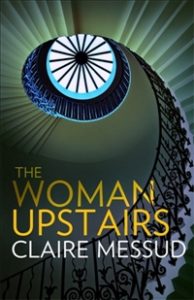 This novel is supposed to be about an angry woman, and somehow this is supposed to be ground-breaking. Heaven forfend to have a female protagonist who might be unlikeable. But I don’t blame Claire Messud for this, I blame publishing today where there has to be a selling point. Pigeon-holing a novel means that all the discussion will be around this point, and the nuances of Messud’s work are missed.
This novel is supposed to be about an angry woman, and somehow this is supposed to be ground-breaking. Heaven forfend to have a female protagonist who might be unlikeable. But I don’t blame Claire Messud for this, I blame publishing today where there has to be a selling point. Pigeon-holing a novel means that all the discussion will be around this point, and the nuances of Messud’s work are missed.
After saying the above, I do admit that I, too, was annoyed by the main character, Nora, but not because she was ‘angry’ – I like angry and I like an acerbic narrator (if you want angry try Zoe Heller’s Notes on a Scandal). I was annoyed really, because rather than angry she was passive. She is supposed to stand for something like self-realisation (in the eyes of reviewers), and I don’t think she stands for that at all. But what perhaps annoyed me the most, and this is Messud’s fault, is the inconsistency in the character. To me Nora just didn’t ring true.
Nora is a primary-school teacher – childless, partnerless, and has supposedly put her artistic ambitions in the back drawer – for what? To do the right thing and get a steady job? Why? She professes to love her job but you could have fooled me. She professes to somehow have to look after her ailing father, but she does precious little of this. Nora doth protest too much, and Messud never really convinces in her portrayal of a woman hemmed in by circumstance. Nora is 37 at the time of the main action of the book, yet her thoughts and her persona are of a much older woman looking back over an unfulfilled life. She’s young by today’s standards, why on earth does she have to stay in her job?
And another thing – am I the only person who sees Nora as a parasite? Much is made of the betrayal she receives at the hands of the Shahid family (a betrayal that turns out to be a damp squib). yet Nora has insinuated herself into the life of this family. Firstly through falling ‘in love’ with their young son, Reza, who’s in Nora class, then through her crush on Sirena, his artist mother, and finally, it’s the father. If there is a betrayal going on, it’s Nora who is committing it.
Messud can’t have missed this interpretation – her intent can’t just be to portray the ‘angry woman’ who is justified in her anger by a feminist argument of the sidelining of women, but something more. Guess what? This isn’t a message book, it’s more complicated than that – like good literature, it present a view, immerses us in someone’s life and gets us to examine our responses to it. Messud’s writing is muscular and rewarding, she can write about art and make it believable (no small feat) and there are some lovely portrayals – Nora’s mother and father, among them.

